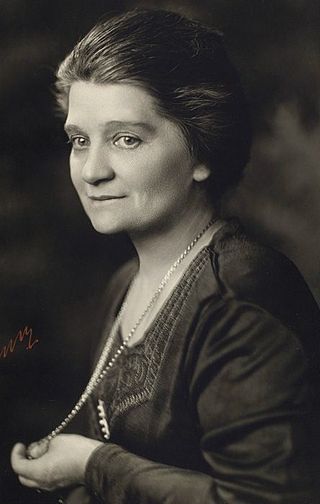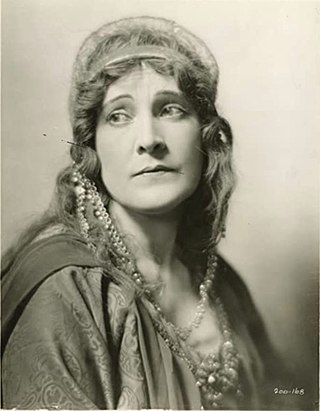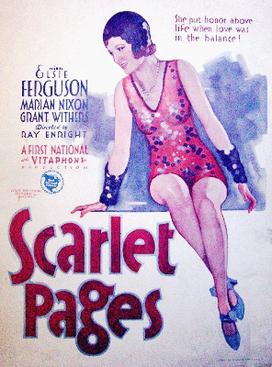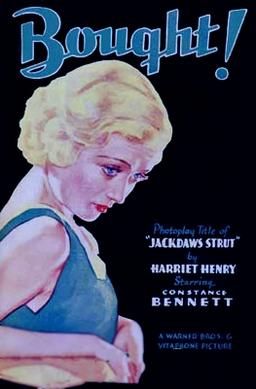
The Broadway Melody, also known as The Broadway Melody of 1929, is a 1929 American pre-Code musical film and the first sound film to win an Academy Award for Best Picture. It was one of the early musicals to feature a Technicolor sequence, which sparked the trend of color being used in a flurry of musicals that would hit the screens in 1929–1930.

Marie Josephine Hull was an American stage and film actress who also was a director of plays. She had a successful 50-year career on stage while taking some of her better known roles to film. She won an Academy Award for Best Supporting Actress for the movie Harvey (1950), a role she originally played on the Broadway stage. She was sometimes credited as Josephine Sherwood.

Constance Campbell Bennett was an American stage, film, radio, and television actress and producer. She was a major Hollywood star during the 1920s and 1930s; during the early 1930s, she was the highest-paid actress in Hollywood. Bennett frequently played society women, focusing on melodramas in the early 1930s and then taking more comedic roles in the late 1930s and 1940s. She is best remembered for her leading roles in What Price Hollywood? (1932), Bed of Roses (1933), Topper (1937), Topper Takes a Trip (1938), and had a prominent supporting role in Greta Garbo's last film, Two-Faced Woman (1941).

Kay Francis was an American stage and film actress. After a brief period on Broadway in the late 1920s, she moved to film and achieved her greatest success between 1930 and 1936, when she was the number one female star and highest-paid actress at Warner Bros. studio. She adopted her mother's maiden name (Francis) as her professional surname.

Sonny Boy is a 1929 sound part-talkie film released by Warner Bros., directed by Archie Mayo. In addition to sequences with audible dialogue or talking sequences, the film features a synchronized musical score and sound effects along with English intertitles. The soundtrack was recorded using the Vitaphone sound-on-disc system. The film stars Davey Lee, Edward Everett Horton, and Betty Bronson.

Mary Brian was an American actress who made the transition from silent films to sound films.

Glorious Betsy is a 1928 sound part-talkie drama film. In addition to sequences with audible dialogue or talking sequences, the film features a synchronized musical score and sound effects along with English intertitles. The soundtrack was recorded using the Vitaphone sound-on-disc system. The film is based on the 1908 play of the same name by Rida Johnson Young, and it stars Dolores Costello. It was produced by Warner Bros. and nominated for an Academy Award for Best Writing, Adaptation in 1929. The film was directed by Alan Crosland with cinematography by Hal Mohr.

Sally O'Neil was an American film actress of the 1920s. She appeared in more than 40 films, often with her name above the title.

Lucy Beaumont was an English actress of the stage and screen from Bristol.

Winnie Lightner was an American stage and motion picture actress.

Paris is a 1929 American pre-Code musical comedy film, featuring Irène Bordoni. It was filmed with Technicolor sequences: four of the film's ten reels were originally photographed in Technicolor.

Claire McDowell was an American actress of the silent era. She appeared in 350 films between 1908 and 1945.

Beryl Mercer was a Spanish-born American actress of stage and screen who was based in the United States.

My Bill is a 1938 American drama film starring Kay Francis as a poor widow raising four children. It was based on the play Courage by Tom Barry.

Blanche L. Friderici was an American film and stage actress, sometimes credited as Blanche Frederici.
Bubbles is a 1930 American Vitaphone Varieties short film released by Warner Bros. in Technicolor. It was filmed in December 1929 at the First National Pictures studio with Western Electric apparatus, an early sound-on-film system, Rel. No. 3898. Bubbles is one of the earliest surviving recordings of Judy Garland on film, at 8 years old.

Dearie is a 1927 American silent drama film produced and distributed by Warner Bros. and directed by Archie Mayo. It is from a story by Victorian author Carolyn Wells about a woman who sacrifices for her ungrateful son. This film starred Irene Rich and it is possible that the film may have been released with a Vitaphone soundtrack.

Scarlet Pages is a 1930 pre-Code American crime drama film with songs starring Elsie Ferguson and directed by Ray Enright. It was produced and distributed by First National Pictures, a subsidiary of Warner Bros. The film stars Elsie Ferguson, John Halliday, Grant Withers and Marian Nixon. Scarlet Pages is based on a 1929 Broadway play of the same name that Ferguson also starred in. It is similar in theme to the better remembered Five Star Final, also by Warners released a year later. The film simultaneously marked the first time Ferguson appeared in a sound film and the last film she ever made.

Bought is a 1931 American Pre-Code drama film produced and released by Warner Bros. and directed by Archie Mayo. The movie stars Constance Bennett and features Ben Lyon, Richard Bennett and Dorothy Peterson. It is based on the 1930 novel Jackdaw's Strut by Harriet Henry.

Show Girl is a 1928 American synchronized sound comedy-drama film starring Alice White and Donald Reed. While the film has no audible dialog, it was released with a synchronized musical score with sound effects using the sound-on-disc Vitaphone process. The film was based on the first of J. P. McEvoy's two Dixie Dugan novels, as was the 1929 musical. It was followed by a sequel, Show Girl in Hollywood (1930).




















